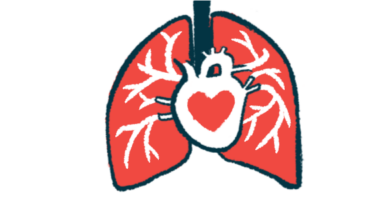CBD has potential to boost heart function in PH patients: Early study
Cannabidiol found to ease signs of cardiac fibrosis in rat model of PH

Treatment with cannabidiol (CBD) for three weeks lowered signs of cardiac fibrosis, or scar tissue build-up, in a rat model of pulmonary hypertension (PH).
The findings indicate that CBD may be beneficial for boosting heart function in PH patients via inhibition of certain pro-fibrotic signaling pathways, according to researchers, who noted “further detailed investigations are recommended to confirm our promising results.”
The study, “Cannabidiol alleviates right ventricular fibrosis by inhibiting the transforming growth factor β pathway in monocrotaline-induced pulmonary hypertension in rats,” was published in the journal BBA – Molecular Basis of Disease.
PH is a chronic disease marked by increased pressure in the pulmonary arteries supplying blood from the heart to the lungs.
In the long term, PH is associated with remodeling of cardiac tissue, including inflammation, fibrosis (scar tissue build-up), and over-activation of fibroblasts, a type of connective tissue cell involved in fibrosis.
Ultimately, these changes can cause failure of the heart’s right ventricle that pumps blood to the lungs.
CBD is main non-psychoactive component of cannabis
CBD is the main non-psychoactive component of cannabis. An oral formulation of CBD is sold under the brand name Epidiolex for the treatment of seizures in certain patients.
In preclinical studies, CBD has been found to be of benefit in the lungs of rodent PH models. Specifically, it has been shown to reduce thickening of the pulmonary artery walls, ease inflammation, and boost antioxidant activity in the lungs.
Moreover, an oral formulation of CBD was found to reduce pulmonary artery pressure in healthy volunteers under PH-mimicking, or low oxygen, conditions.
Still, its effects specifically on the heart in PH have not been investigated. CBD has been found to improve cardiac performance and ease cardiac fibrosis and inflammation in other animal models.
As such, the research team in Poland set out to explore the potential for CBD to combat cardiac fibrosis in a rat model of PH.
Rats with PH and their healthy counterparts were given injections of CBD or a placebo once per day for three weeks, after which their right ventricles were analyzed for signs of fibrosis.
Results showed that PH rats had increased blood levels of NT-proBNP, a marker of heart failure, compared with healthy rats. CBD treatment significantly reduced NT-proBNP in the PH model, reaching levels similar to healthy animals.
Moreover, the rat PH model was characterized by a number of changes in the heart tissue, including expansion of cardiomyocytes, or cardiac muscle cells. Wider cardiomyocytes are reflective of a thickening of the heart’s walls.
Three weeks of CBD treatment led to about a 10% reduction in the width of cardiomyocytes and a 70% reduction in fibrosis of the right ventricle relative to the placebo group.
Other markers of fibrosis reduced with treatment
A number of other markers of fibrosis and associated signaling pathways were also reduced with treatment, including indicators of fibroblast activation.
VE-cadherin, a molecule associated with regulating fibrosis, was increased with CBD treatment.
Among the specific effects of CBD was suppression of components of TGF-beta/SMAD2 and Gal-3 pro-fibrotic signaling pathways. The researchers believe this may indicate that CBD could be therapeutic via its actions on these pathways.
Of note, CBD did not completely reverse all of the pro-fibrotic changes observed in the PH model, “which may suggest that it does not act on all signaling pathways leading to [right ventricle] remodeling in PH,” the researchers wrote.
Also, it remains to be seen whether this reduction in fibrosis is indeed linked to improved cardiac function in PH.
“CBD may be used in the future as an adjuvant therapy in the treatment of PH, but this requires confirmation in further experimental and clinical studies, with particular attention to other signaling pathways,” the team concluded.









